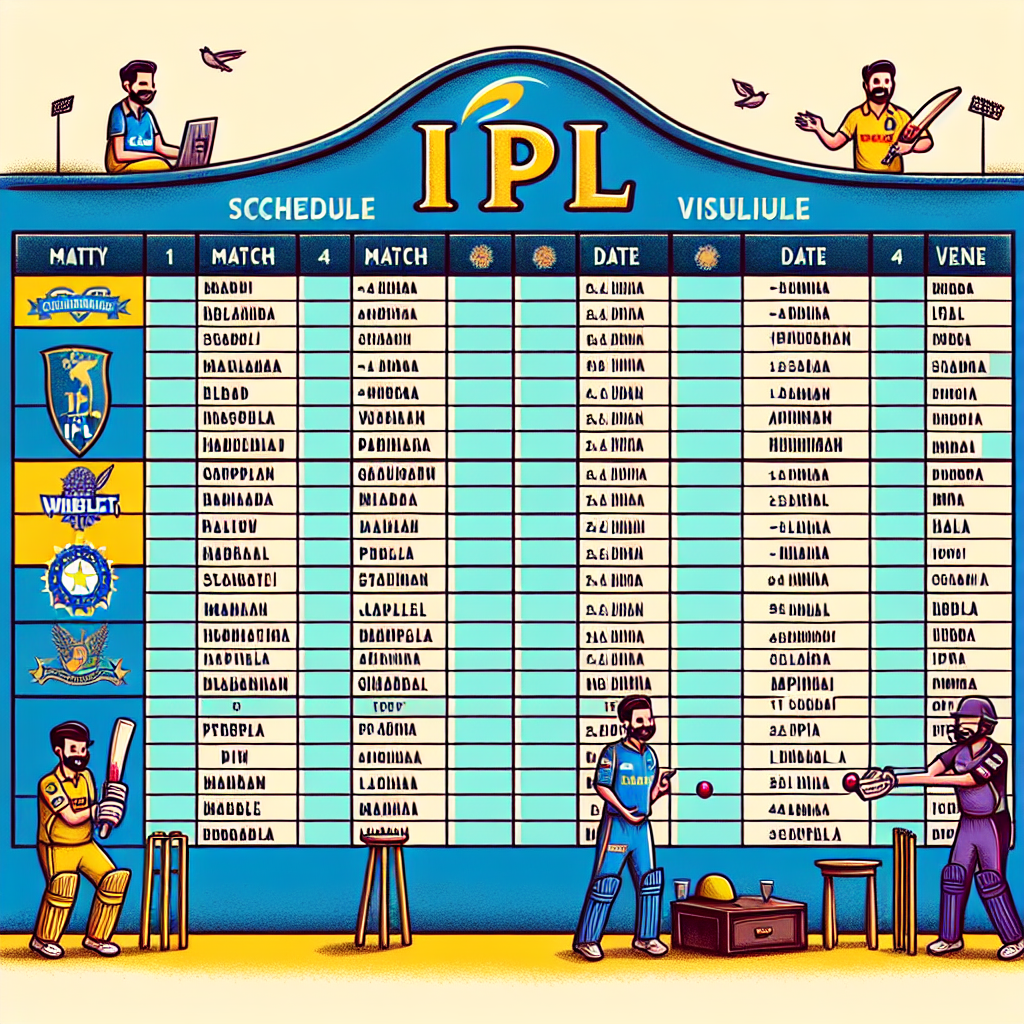ipl match schedule list
Understanding the IPL Match Schedule: A Comprehensive Guide

The Indian Premier League (IPL) is one of the most celebrated cricket tournaments globally, attracting millions of fans and viewers each year. The excitement surrounding the IPL is not just about the matches themselves but also about the anticipation of the schedule. The IPL match schedule is a crucial component that dictates the flow of the tournament, impacting teams, players, and fans alike. This article delves into the intricacies of the IPL match schedule, offering insights into its structure, significance, and the factors influencing its formulation.
The Structure of the IPL Match Schedule
The IPL match schedule is meticulously crafted to ensure a balanced and competitive tournament. It typically spans over a period of two months, featuring a series of matches that culminate in the playoffs and the final. The schedule is divided into several phases:
- Group Stage: The initial phase where all teams compete against each other in a round-robin format. Each team plays a set number of matches, both home and away.
- Playoffs: The top four teams from the group stage qualify for the playoffs, which include the Qualifier 1, Eliminator, Qualifier 2, and the Final.
- Final: The two best teams face off in the final to compete for the championship title.
Factors Influencing the IPL Match Schedule
Several factors are considered when formulating the IPL match schedule. These include:
- Team Logistics: The schedule must accommodate the travel and rest requirements of the teams, ensuring they have adequate time to recover between matches.
- Venue Availability: The availability of stadiums plays a crucial role, as many venues host multiple events and need to be booked in advance.
- Broadcasting Requirements: The schedule is also influenced by broadcasting partners, who have specific time slots that maximize viewership.
- Weather Conditions: Weather patterns are considered to minimize disruptions due to rain or extreme heat.
Case Study: The 2023 IPL Schedule
The 2023 IPL season was a testament to the complexity and precision involved in scheduling. With ten teams participating, the schedule had to accommodate 74 matches over a span of 60 days. Here are some key highlights:
- Balanced Distribution: Each team played 14 matches, ensuring a fair chance for all teams to qualify for the playoffs.
- Strategic Venues: Matches were strategically placed in venues that maximized fan attendance and minimized travel fatigue for players.
- Prime Time Slots: Most matches were scheduled during prime time to capture the highest possible audience, both in-stadium and on television.
The Impact of the IPL Schedule on Teams and Players
The IPL schedule significantly impacts teams and players, influencing their performance and strategy. Here’s how:
- Team Strategy: Teams often plan their strategies based on the schedule, analyzing opponents and conditions to optimize their performance.
- Player Rotation: Coaches use the schedule to manage player workloads, ensuring key players are rested and fit for crucial matches.
- Injury Management: The schedule allows teams to plan for potential injuries, ensuring they have adequate backups and recovery time.
Statistics and Trends in IPL Scheduling
Over the years, certain trends have emerged in IPL scheduling. Analyzing these trends provides valuable insights into the tournament’s evolution:
- Increasing Number of Matches: The number of matches has steadily increased with the addition of new teams, enhancing the tournament’s competitiveness.
- Home Advantage: Teams often perform better at home venues, a factor considered when scheduling matches to maintain a level playing field.
- Weekend Matches: A significant portion of matches is scheduled on weekends to maximize attendance and viewership.
Challenges in Formulating the IPL Schedule
Creating the IPL schedule is not without its challenges. Some of the primary challenges include:
- Unforeseen Events: Political events, natural disasters, or pandemics can disrupt the schedule, requiring quick adjustments.
- Player Availability: International commitments of players can affect team compositions, necessitating schedule adjustments.
- Security Concerns: Ensuring the safety of players and fans is paramount, influencing venue selection and match timings.
The Role of Technology in IPL Scheduling
Technology plays a pivotal role in formulating and managing the IPL schedule. Advanced software and algorithms are used to:
- Optimize Travel: Algorithms help minimize travel time and costs, ensuring teams have more time to rest and prepare.
- Predict Weather Patterns: Weather forecasting tools are used to schedule matches in favorable conditions, reducing the risk of rain delays.
- Enhance Fan Engagement: Digital platforms provide fans with real-time updates and interactive schedules, enhancing their engagement with the tournament.
Conclusion: The Significance of the IPL Match Schedule
The IPL match schedule is more than just a list of fixtures; it is a strategic blueprint that shapes the tournament’s success. By balancing team logistics, venue availability, and broadcasting requirements, the schedule ensures a seamless and exciting experience for players and fans alike. As the IPL continues to grow, the importance of a well-structured schedule becomes even more critical, influencing the tournament’s competitiveness and global appeal. Understanding the intricacies of the IPL schedule offers valuable insights into the world of professional cricket and the meticulous planning that goes into creating one of the most thrilling sporting events on the planet.






